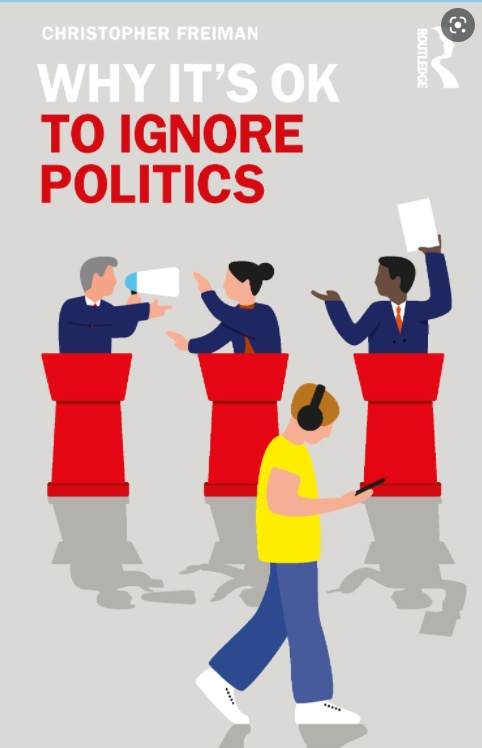
Some wisdom from Chris Freiman, reposted with his permission.
Somewhat related to my recent piece on motivated reasoning about deterrence.
I’ve noticed a bunch of suspiciously convenient asymmetries in influence lately. That is, people tend to believe that they are influential when that would produce the results they want and believe that they aren’t influential when influence would produce results they don’t want. Two examples:
1) People think the example they set by voting or eating vegan will cause a bunch of others to follow suit. But they don’t think the example they set by drinking or speeding will influence others.
2) Academics will respond to the accusation that they indoctrinate students by noting that they can’t even get students to read the syllabus. Fair enough, but if we can’t even get students to read the syllabus, it’s hard to see how higher education is going to help enrich and illuminate the lives of our students.

READER COMMENTS
Infovores
Dec 14 2021 at 9:51am
The arts are a big offender in this regard. When they’re angling for funding or putting on an award show, they make their vocation out to be the pinnacle of teaching and inspiring the next generation about “what it means to live a life.”
But whenever someone suggests the arts could be promoting drugs, violence, or immorality they pivot to “it’s just a movie”.
David Seltzer
Dec 14 2021 at 11:39am
I think the term is hypocrisy.
Ghatanathoah
Dec 15 2021 at 1:58pm
@Infovores
I think there’s a slightly more charitable explanation for this. When people talk about how art uplifts people, they are usually talking about the explicit, intentional messages that the art is sending. As in, messages that the creators intended the art to convey.
When people accuse art of promoting negative behavior, they are not usually saying that the creators intentionally put explicit messages promoting it in the art. They are accusing the art of having implicit, hidden messages promoting negative behavior. Usually they don’t have any evidence for this beyond “the art portrays negative behavior, therefore it must secretly promote and condone it.” I frequently hear people say a piece of art “promotes” or even “glorifies” some horrible thing simply because that horrible thing is portrayed in the art. Even if the characters doing horrible stuff are clearly shown to be the villains!
I think it’s reasonable to say that people can be uplifted by the explicit messages art sends, but aren’t really affected by any implicit messages that it allegedly contains. This matches how I experience art. If I watch a movie where a heroic character struggles with self-destructive behavior I understand that I should admire the heroic stuff the character does, but not emulate the self-destructive behavior.
I personally think the people who accuse art of promoting violence and immorality are being disingenuous. I think the real reason they say art promotes those things is that they find it distasteful to see them portrayed. But they know on some level that they have no right to deprive other people of art just because they find it distasteful. So they make up some nonsense about how portraying immorality “promotes” it in order to justify overriding other peoples rights and desires with their own.
Infovores
Dec 16 2021 at 4:05pm
Your appeal for greater charity toward the arts would be better received if you were willing to be more charitable to those concerned about the negative effects of messaging in art. Many who are concerned about these effects are genuine, though I’m sure there are some (probably very loud) actors in this space who are not well-intentioned.
More broadly, I think about issues of morality in artistic works in terms of representation vs. advocacy. The Lion King represents the attitude that responsibility can be casually abandoned without consequence (“Hakuna Matata”) but ultimately advocates taking on responsibility. There are many other films that do the reverse in my opinion. The point is not to dwell on any particular case, which will always admit room for disagreement, but the issue of how art affects social norms of behavior is a vitally important one that should be considered legitimate for discussion. Russ Roberts and Paul Bloom had a wonderful and nuanced discussion on this recently as part of their conversation on “The Sweet Spot”.
As a relatively minor point, I think you underestimate the extent to which artists explicitly promote a set of worldviews in an intentional fashion. Ben Shapiro’s “Prime-Time Propoganda” probably exaggerates the problem in some respects, but provides many clear examples of the basic behavior as well.
Infovores
Dec 16 2021 at 4:30pm
I said “there are many other films that do the reverse”—clumsy wording on my part.
I meant to say that there are films that step over the line dividing representation and advocacy.
Thomas Lee Hutcheson
Dec 15 2021 at 7:16am
Just to be contrary, maybe it’s correct that our good actions — if known and seen — are more influential than our evil, concealed actions. Vegans let other people know (maybe too much but that’s a different story) they are vegans. Speeders don’t usually brag about speeding.
Phil H
Dec 15 2021 at 7:46am
“speeding vegans”?! That’ll be the day…
I mean, the broader point is right, but I’m not sure speeding vegans are one of society’s great menaces. You can just push them off their bicycles…
Comments are closed.